Our Community of Service
Every year Drexel medical students perform thousands of hours of community service, while their role models — faculty and alumni — similarly give of themselves to an amazing array of causes.
New students who may be unsure if they have the time will find it right in the curriculum: community service is a first-year requirement. Why? Eric Belser, now a second-year student, was surprised how often people asked him why service was part of the curriculum. "The answer seemed so clear to me from the start," he says. "If more and more Americans are gaining access to medicine, yet our physicians are becoming more and more disconnected from the lower to middle class, how can those physicians begin to relate to, or even take into consideration, the lifestyle, diet, resources and environment of a patient when making decisions about their health? The community experience aims to approach this divide head-on."
The students have dozens of sites and types of service to choose from. The Office of Community Experience has relationships with some 50 social service agencies and public schools. Many of the opportunities involve tutoring, mentoring or coaching children or teenagers. Some students work with people who are elderly, homeless or abused. By design, the projects are non-clinical because the idea is for students to understand the non-biological factors that affect health.
"They get really good practice in communicating with folks — kids or adults who don't have as much education, or adults who had education but really hard lives," says Elissa Goldberg, program director in the Office of Community Experience. "One of my main hopes is that students will learn that the people who live in the community with fewer resources than they have are just like them — they have hopes and dreams, pains and joys like anybody else."
Some students run in the Back on My Feet program, in which volunteers come out to homeless shelters in the early morning to run with the residents. The idea is to use running to help people experiencing homelessness gain strength and confidence.
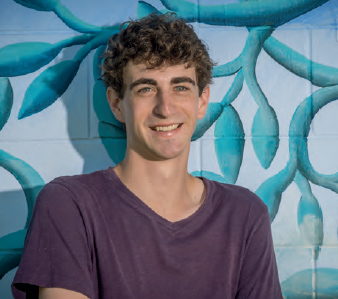
As counselors for the Healthy Choices Summer Camp, Eric Belser and fellow volunteers — a couple of classmates and a student from Drexel's Creative Arts in Therapy program — arrived to clean and organize two weeks before camp began, giving them a head start on teamwork and a smooth start for the children.
Another program, Spark Philadelphia, connects 7th- and 8th-graders with people in professional settings to keep them engaged in their education and reduce the city's dropout rate. Medical students act as the professionals for participants who are interested in medicine or science. They meet with their middle-schoolers several times to work on a specific project. For example, when her mentors found out that one girl was interested in bones, they helped her learn how to learn about the topic.
On the other hand, in the Elders Project, medical students are matched one-on-one with older adults who serve as mentors to them. Elder and student meet in the older person's home several times over the year. For the students it is eye-opening. "They're so interesting and have so many great stories," students tell Goldberg. The older adults teach them about what they've learned in their own lives, and the students see that even with physical problems and other burdens, older adults can be happy.
In contrast to these groups, the people Eric Belser worked with for his first-year service had a different vantage point. He chose an assignment at Isles Youth Institute in Trenton, N.J., where he helped adults from 18 through 25 prepare for the GED test. He found his job rewarding and frustrating by turns — some students benefitted from his efforts; some students drifted away as the summer wore on. But, to Goldberg's point about the significance of communication, what Belser found most meaningful in his experience were two tough and honest conversations he had — one with his students, and one with a veteran teacher.
Above and Beyond
The majority of students continue in service after their first-year requirement. In July, Belser tackled a new role, as a counselor with other Drexel students at a day camp for elementary to middle-school children in Philadelphia's Strawberry Mansion section. The counselors were there through Bridging the Gaps, an interdisciplinary program that brings together students from Philadelphia's medical and health professions schools.
Leslie Everts, MD, an assistant professor of family medicine and director of Drexel's Student Health Service, is a Bridging the Gaps preceptor, responsible for supporting two to four students. "I'll have them come together as a group, and we go to a local restaurant for dinner and discuss what they're doing and working with an urban population.
"They may not realize as they're doing Bridging the Gaps how much of an effect it's going to have on them," Everts says, "but I think it helps them to mature; I think it shows them a different world."
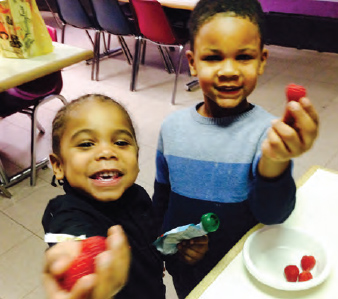
Mothers and children staying at the Eliza Shirley House receive fresh fruit once a week for their evening snack, thanks both to students who carried out their idea for "Nutritious Nibbles" and to a very generous produce vendor.
Everts, who has long had an interest in the urban underserved, is a regular volunteer at a student-run Salvation Army clinic in Roxborough. The College of Medicine's Health Outreach Project, or HOP, comprises several clinics run by first- and second-year students, at the Salvation Army Adult Rehabilitation Center, the Salvation Army Eliza Shirley House, Streetside, The Arc of Philadelphia, and two mobile "pop-up" clinics, at the Nationalities Service Center and the True Gospel Tabernacle Childhood Education Program. (Streetside is a joint project with other medical schools.)
Students recruit physicians (usually two per site), order supplies, set up the clinic each week and do patient intakes, including a brief history and vital signs. A physician performs the major part of the exam but may engage the student in a teachable moment if the patient has interesting findings. For example, explains Everts, "If the patient's heart sounds are interesting, we have the student take a listen." The students love the clinics — each year about 300 first-and second-year students participate in the Health Outreach Project, even though clinical work does not satisfy the community service requirement.
Streetside, now housed in a church in Kensington, began on the street in conjunction with Prevention Point Philadelphia, a remarkable public health organization that grew out of a syringe exchange. Second-year student Shravan Savant is the steering coordinator for the clinic, where people come from all parts of the city as well as Camden, N.J.
"It's a really diverse population, from people who need a medical assessment form to people who need acute care," Savant says. "Recently the majority are patients who have just come from incarceration." Students do the basic history and physical, and present the patient to the attending. It is rewarding to talk with people who are trying to make a difference in their own lives, Savant says. "The patient clientele is one of the most thankful and kind-hearted populations you can see."
The Arc of Philadelphia is the site of the newest HOP clinic. The Arc is a national organization that promotes and protects the human rights of people with intellectual and developmental disabilities and actively supports their full participation in the community. The HOP clinic at The Arc is the first medical student–run free clinic dedicated to serving intellectually disabled adults in the country. Medical students provide a weekly walk-in clinic at The Arc day center in North Philadelphia and participate in the CDC-funded HealthMeet screening and prevention program. Students also provide acute care visits under the direct supervision of a licensed physician and do some monitoring of chronic illness like high blood pressure.
"Being able to interact with a person with intellectual disability as a part of their normal routine, rather than in a hospital or office setting, is a really special opportunity and our students love it," says Olivia Ruth, a third-year medical student who has served as the clinic's steering coordinator.
One clinic site in particular seems to inspire creative energy. The Salvation Army Eliza Shirley House is an emergency shelter for women and their children. Last January, two second-year medical students, Hera Mahmood and Aimee McMullin, noticed that the evening snacks provided to children at the shelter were essentially junk food. They approached the Office of Community Experience to ask if HOP funds could be used to purchase fresh fruit for all the shelter residents to have one evening a week. The office agreed. Mahmood and McMullin then went to Iovine Brothers at Reading Terminal Market and spoke with one of the managers. Instead of charging them, he has provided a free weekly snack of fruit for the women and children at the shelter ever since.
Jump Into Reading, another medical student organization, goes into Eliza Shirley to read to the children for one hour each week. Michaela Simoncini, Class of 2017, who coordinated the program last year, says the medical students have been able to help the children by sparking a passion for reading and improving their reading skills. The volunteers also collect and donate a variety of books for the children, building a little library at the facility.
Back to Top
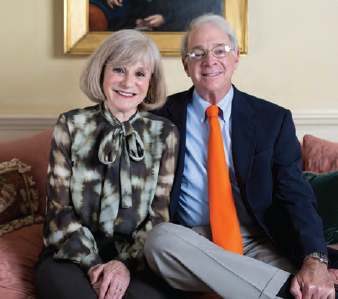
Micki and Lanny Edelsohn, MD, who established the foundation Homes For Life, were inspired by their son to create safe, appropriate and affordable housing for people with intellectual and developmental disabilities.
In 1999, Lanny Edelsohn, MD, HU '67, a neurologist, and his wife, Micki Edelsohn, founded Homes For Life, a foundation that builds and furnishes homes for people with intellectual and developmental disabilities. Homes For Life was established in honor of their son Robert who, due to a birth injury, has significant intellectual and developmental disabilities.
Through their foundation, the Edelsohns have donated 21 homes to The Arc of Delaware, deeding them for one dollar for use as small group homes. They have constructed a total of 25 neighborhood group homes in New Castle County and donated two new condominiums as well. With four residents per house and two per condo, 104 persons with intellectual and developmental disabilities now live with supervisory staff in a safe home. These "homes for life" cost as much as $400,000 each to build and furnish; the foundation itself has no paid staff.
The Edelsohns are passionate about their mission. In a letter to the Delaware News Journal last year, Dr. Edelsohn wrote about the "affordable housing crisis" for adults who are unable to live independently. "Every week I treat patients who are in great need of safe and supervised environments. And I see families, struggling bravely, and under great adversity, to care for them, often as their own health and welfare decline. Homes For Life foundation will continue to work diligently to find the most appropriate and affordable housing options for people with intellectual and developmental disabilities."
In 2008, Susan F. Sordoni, MD, MCP '97, established the Volunteers in Medicine Clinic in Wilkes-Barre, Pa., a facility that has served more than 12,000 patients who work but are uninsured or underinsured. The clinic provides primary and preventive care, counseling services, nutrition education, eye care, physical therapy and more. Dr. Sordoni is immediate past chair and continues to serve as a volunteer physician for the clinic. Under her leadership, Volunteers in Medicine added a free dental clinic in 2011, responding to the unusually high need for dental services in Luzerne County. Sordoni also works as a physician at the Children's Advocacy Center in Scranton as a medical examiner for children who have been physically or sexually abused and continues to work as a medical director for Celtic Hospice.
Like the Edelsohns and Sordoni, Maurice Hinson, MD '15, saw a need and had a vision for filling it. In 2012, he founded the DUCoM Mentoring and Pipeline Program to foster the success and well-being of teenagers in an underserved Philadelphia community. The program matches high school students with medical students of similar background, who provide weekly tutoring, collaborate in service projects, and expose the students to science and health topics in monthly workshops.
"Like most teenagers, they don't want to spend more time doing homework," says Julie Hyppolite, a third-year medical student, who was a coordinator as well as a tutor. "Once you develop that relationship with them and show that you care about them doing well in school, they try to produce those results for you."
The monthly workshops are particularly engaging. Last year, the high school students learned about the heart and how to take blood pressure; they visited the gross anatomy lab and encountered cadavers; and they took on the roles of doctor, nurse, and recorder in the Simulation Center. "They really loved that," Hyppolite says, "taking the information we were giving them, and applying it in a kind of real setting. [The program] encourages them to see themselves where they never really thought about being."
Back to Top
A life-changing and life-saving medical platform in Uganda came about through a series of coincidences that connected Makerere University in Kampala to Rotary International and Drexel Obstetrics & Gynecology. The product of their collaboration, active across 7,000 miles, is the Maternal and Child Health Care Education Project.
Prior to beginning the project, Owen Montgomery, MD, HU '81, chair of Obstetrics & Gynecology at Drexel, had been on a medical mission in Gambia, one of many such trips he has made. Ryan Smith, a medical student at the time, was aware of Montgomery's global work and thought to connect his obstetrics professor with his father, Ron, who had similar interests. An alum of Drexel's College of Engineering, Ron Smith is an officeholder in Rotary International.
One of Rotary's six global agendas is to reduce maternal mortality. Smith had colleagues in Uganda and knew of the great need to improve women's health there. He approached Montgomery with the desire to create a Rotary-funded education project in Uganda.
In 2013, a multidisciplinary team comprising faculty from across Drexel and members of Rotary International created a three-year plan to decrease infant and maternal mortality in Uganda. Partnering with colleagues at Makerere University, they focused on education and the creative use of technology.
The Maternal and Child Health Care Education Project relies on hands-on learning in both Kampala and remote rural areas. It also emphasizes simulation and distance learning. The College of Medicine and the Makerere School of Health have held joint conferences and grand rounds. Each year, faculty from Makerere visit Drexel and vice versa.
Over time, the project expanded. Drexel's College of Computing & Informatics became involved in setting up regional health information centers with digital micro-libraries in rural Uganda. The College of Nursing & Health Professions is helping Makerere's faculty train nurse practitioners in Uganda, which would dramatically increase the number of providers to take care of women and children.
The final link in this dynamic is the power of simulation. Montgomery had returned from his various mission experiences, he says, "with the desire to increase the knowledge of anyone who was willing to learn how to do a life-saving delivery — not just obstetricians or surgeons."
An international competition — Saving Lives at Birth: A Grand Challenge for Development — offered the impetus he needed. Montgomery and colleagues created a lifelike cesarean-section simulator and submitted it to the competition. They proposed to use the high-fidelity vascularized model of a pregnant abdomen to train midwives and other providers in underserved areas to safely perform an emergency C-section. Their project was one of only 19 to receive a seed grant, out of 600 submissions.
In November, a team will travel to Uganda to teach nonsurgeons to perform C-sections, as part of a grant from Johnson & Johnson.
The teaching goes both ways. At a time in American health care when professionals are expected to do more with less, Montgomery says, "we have a lot to learn about value-based use of resources." In the Ugandan hospital, they have made "virtue out of necessity. The people are generous, patient and interested in improving care. They do so much with so little."
Back to Top
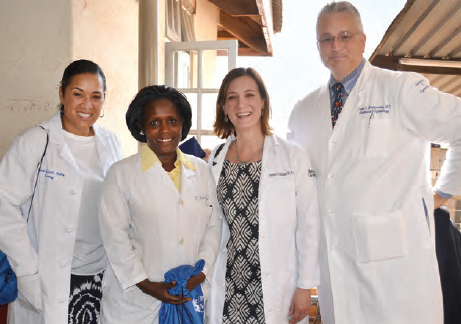
The Maternal and Child Health Care Education Project brings Drexel faculty to Makerere University in Uganda and vice versa. Here, in Kampala, a Makerere obstetrics and gynecology resident (second from left) met up with Drs. Yanick Vibert, Drexel Pediatrics, and Laniece Coleman and Owen Montgomery, Drexel Obstetrics & Gynecology.
As a first-generation American graduating from medical school, neonatologist Yanick Vibert, DO, MPH, promised her Haitian grandmother she would not forget her roots. Indeed, in 20 years of global health work, Dr. Vibert has made dozens of medical trips to Haiti alone. But it's a big globe.
Her more recent travels have been to Uganda (as part of Montgomery's team), Gambia, and Guyana. In August, Vibert, an assistant professor of pediatrics based at St. Christopher's Hospital for Children, was in Gambia as co-instructor for a maternal and child health class with Shannon Marquez, PhD, Drexel's director of global public health initiatives.
Vibert is particularly focused now on a program called Helping Babies Breathe, which teaches the essential techniques of newborn resuscitation to birth attendants in resource-limited areas. The program seeks to reduce newborn mortality by having at least one person trained in resuscitation at every birth. According to a study of Helping Babies Breathe in Tanzania (PLOS One, July 2014), it is a success.
On one of Vibert's many trips to Haiti after the 2010 earthquake, she noticed the same woman in the NICU every day. The mother was practicing kangaroo care with her daughter — holding the preemie skin-to-skin against her chest with her shirt or a blanket on top. "I'm looking at this mom who's holding her baby, and if I close my eyes, I could see the same mom in Philadelphia," Vibert says. "It's just a mom who was holding her baby — having the same wants, having the same hopes."
In late summer 2015, Vibert was in a NICU in Banjul, Gambia. She continues, "There was a mother sitting by a broken incubator — there was no heat coming into the incubator — who was holding her child to her chest. And I remembered the woman I had seen in Haiti five years ago. Then I thought of a mother at St. Christopher's three weeks prior who had been doing the same thing.
"It just really hit me," Vibert explains. "we really are the same people, who really want the same thing … a moment of recognizing how blessed I was to be a part of this — to recognize and see that the moms here in Philly are really no different than the moms in West Africa, the moms in Haiti, the moms in Guyana."
Vibert says it is her good fortune to be part of a community that supports her outreach along with her clinical work. In addition to Marquez and Montgomery, she cites Drs. Maria Delivoria-Papadopoulos, Vineet Bhandari and Endla Anday (all Drexel faculty at St. Christopher's), as well as Dean Schidlow, for making her global work possible.
And Vibert says with conviction, "Clearly, there's more I have to do."
Back to Top
For the past 10 years, James C. Reynolds, MD, the June F. Klinghoffer Distinguished Professor and chair of the Department of Medicine, has been traveling to the foothills of the Himalayas every 18 months. In this remote region, he spends two weeks with a medical team treating rural Nepalese who have very little access to hospitals. It's a special type of long-term investment.
"I always wanted to help," Dr. Reynolds says of his medical outreach. "I wanted to be part of an organization that wasn't just a fly-by-night — what is sometimes called medical tourism. I wanted to do something that would have more of an enduring effect."
He was pushed into action, however, when he saw a woman at church who was selling all her belongings. "She had her own home, her own car, a bunch of antiques," he recalls, "and she was selling everything to go be the housemother for an orphanage for girls. It was such a moving message to me — that somebody would give that much to care for these little kids." Soon after this experience, he connected with the Pennsylvania United Medical Association (PUMA) and went to Nepal.
Through PUMA, Reynolds travels with a small team that routinely includes an ultrasound technician, an obstetrician and a rotating specialist. Team members teach the community medical associates — local Nepalese akin to nurse practitioners — as they work side by side. The associates staff the clinics year-round.
Most of the people in these mountainous regions have never seen a doctor. Transportation is difficult; it is four or five hours by car to the nearest hospital in Kathmandu. Recently, an 83-year-old woman came into the clinic in septic shock. Her husband, a man of similar age, had carried her on his back for the two-hour walk to the clinic. They were able to treat her, but she still needed to be admitted to a hospital. That journey entailed a 45-minute walk down a trail just to get to a car.
Reynolds notes that many people in Nepal never see the benefit of international financial aid. "They have wood plows and homes that are made out of mud and cow dung. Their way of life has changed so little in centuries. And the government has almost no impact on that at all," Reynolds says.
In the case of PUMA, however, Reynolds knows and sees where the funds go. After the devastating earthquakes in April, for example, money went to rice and tarps, and quick rebuilding to provide shelter in anticipation of monsoon season.
Based on his experiences, Reynolds believes that it is better to focus one's resources on a specific place rather than diluting those resources over the many opportunities for service. "If every medical school in the United States picked one country and really put their focus on that place — you could maybe start having a real impact," he suggests.
Reynolds himself will return to Nepal in March 2016. "It's really a tremendous opportunity to take the knowledge that we have and provide it to these very caring, hardworking people who, just by fate of where they were born, live in a very difficult situation."
Back to Top
A continent away, Drexel medical students began a connection with Cameroon in 2009. Each summer since, small groups — mostly rising second-year students — have made their way to the capital, Yaounde, to explore, learn and offer a month of service. Medical student Diane Sun and three of her peers traveled to Cameroon this year for the month of June.
On weekends, they went out with a team of medical students and physicians, including surgeons, dentists, and ophthalmologists, to a village to give medical care. The drive took anywhere from five to 12 hours.
During the daytime, the students shadowed the physicians while they did consults for people who lived in and around the village. At night, they would observe surgeries. "We saw cases where people had inguinal hernias, lipomas that needed to be removed, and hydroceles, as well as some rarer cases," Sun says. The students also packaged medications, such as pain relievers, antibiotics and anti-seizure medications, for distribution to patients.
"Most of the people who came for consults and surgeries had never seen a physician before," Sun says. "It was amazing how grateful the villagers were when we arrived. Overall, it was an incredible experience. Not only did I learn something about medicine and health care abroad, but I also learned about how to adapt to difficult situations, how to problem solve and be patient when obstacles are presented, and how to respect cultures different from my own."
Back to Top
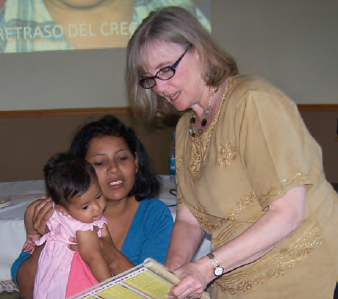
After analyzing a girl's nutrition levels, Priscilla Benner, MD, founder of the MAMA Project, explains the results to the child's mother. MAMA teaches volunteers to do an easy sort of analysis that helps them measure food insecurity.
Priscilla Benner, MD, MCP '75, has overcome many obstacles in the course of her international health work, beginning with the effort to launch the organization she founded and still runs.
"Before I even went to medical school, I had in mind that I wanted to someday do international health work," she says. But life intervened. Benner married and had five babies in 10 years. That kept her busy, along with trying to establish her practice and being a pastor's wife, "which is a lot of community service," she notes. Still, as she read the things that come across doctors' desks — reports of measles outbreaks or child death rates from malaria — she kept asking herself, "Why are children still dying of things that aren't even in our textbooks anymore?"
In the early '80s, one of Benner's sisters went on a college mission trip to Honduras. She came back with heart-breaking pictures, and began to share what she had learned with others, including Benner and another sister. "At first," Benner recounts, "we said, ‘Why aren't people doing more?' Eventually, we began to say, ‘Why aren't we doing something?'" The sisters sought out people who were involved in overseas projects. They met with world hunger experts and food scientists working in public health. They explored model programs, and they started building their dream program, the MAMA Project.
MAMA — Mujeres Amigas (Women Friends) Miles Apart — began working in Honduras in 1987, developing a comprehensive health improvement program. Now the organization provides materials and training to child survival projects around the world.
MAMA's basic training program teaches volunteers going into poor villages what the most important issues are. They learn how to assess the level of food insecurity; they learn the importance of oral health, how to deworm and how to perform examinations. "Our niche is equipping medical brigade teams to efficiently address the most common public health problems to make a positive impact on child and maternal survival," Benner says. "We have trained teams going to Central America, Haiti, and a few African countries, for example." Each year MAMA sends 16 or more teams of U.S. volunteers. "They learn how to put it all into practice, how to set up health stations and what medicines to bring. There's a package," Benner says. "Using our materials, a group who is going from, say, California into Bangladesh can learn what to do, gather their materials, pack their suitcases, and go off with something of great value to offer."
The most effective parts of the program can be adapted to many places. "The things that people would have to change in their habits [to achieve better health] are pretty universal," Benner points out. "We work with communities that don't have a good infrastructure: the places that don't have clean water, don't have roads to get their produce to market, don't have sewer systems. There are things that they can do, like washing hands, building a latrine, improving local food production, immunization, learning about children's nutritional needs."
MAMA has focused its own teams on two disparate tasks that each give a vital boost to family health: promoting the use of a micronutrient powder and cementing over mud floors.
Because malnutrition is prevalent wherever MAMA goes, the organization teaches home food fortification with a micronutrient powder. "We didn't invent this strategy," Benner hastens to say, "but we created a really good formula." The powder includes all of the vitamins and minerals that are essential for survival and is very affordable. The mother puts tiny scoops (0.15cc) in the food that she prepares for her family daily — three for herself, one for the man of the house and two for the growing children.
Currently, every team that MAMA sends overseas is cementing floors in the homes of the poorest of the poor. "We settled on floors because it is truly life-saving", Benner says. "If you're a baby starting to crawl on a mud floor that has been contaminated with chicken manure, pig manure, human waste, spit — and maybe grandpa has TB — it's dangerous. A cement floor can be swept out once a day, maybe with a little water, and the baby's health is much better. Their inoculum of bacteria and virus, parasite eggs and larvae that can go right through the baby's skin — all of that is much less if you just cement the floor." The mother's health is better too, Benner adds; few people can afford shoes, so the mother would have been standing barefoot in the mud.
Benner herself doesn't spend as much time in villages anymore, although that's where she loves to be. Most of her work is in the United States, coordinating the development of MAMA materials, while she maintains her medical practice. She takes a couple of trips a year, but she is visiting government offices, networking with other nonprofits, trying to get past the inevitable barriers to the kinds of assistance MAMA can offer. "There are always walls that keep families from experiencing the benefits of health and nutrition. Our job is to find ways to work with the communities to knock down those walls."
Whichever form it takes, she says, "the work is addictive."
Back to Top